
South Africa is known for its delicious cuisine, and many of our chefs are rated among the best in the world. Eating out is, therefore, a must for any visitor or tourist! Also, knowing a few of the most common restaurant phrases in Afrikaans could really enhance your dining experience—read on to learn why.
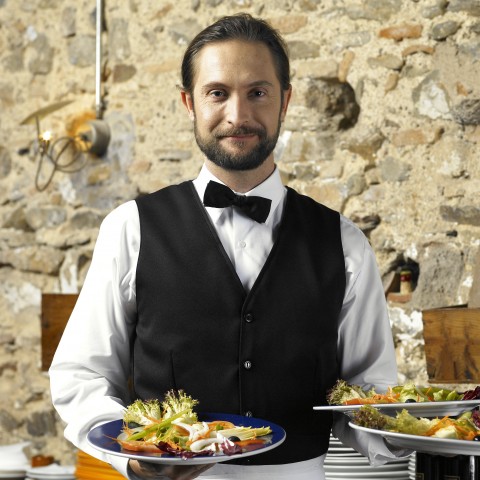
Afrikaner kelners verskaf gewoonlik uitstekende diens. / “African waiters usually provide excellent service.”
- ➜ South African cuisine is unique in its diversity and multitude of influences. Learn more while relishing this mouthwatering overview of typical Afrikaner dishes and delicacies.
 Table of Contents
Table of Contents
- Why is it Important to Know Afrikaans Restaurant Phrases?
- Finding a Good Restaurant in South Africa
- Booking at a Restaurant
- At the Restaurant
- Recommending the Restaurant
- Bonus: Food and Restaurant Vocabulary
- Eating out in Afrikaans with AfrikaansPod101!
1. Why is it Important to Know Afrikaans Restaurant Phrases?
One excellent reason for knowing a few strategic Afrikaans restaurant phrases is that it will likely result in a heartwarming, even mind-blowing experience for the foreign patron! This is not only because many South African chefs are exceptionally skilled.
In general, Afrikaner restauranteurs are consummate hosts who love socializing, but it’s guaranteed that they will, enthusiastically and with wide open arms, welcome any international visitor who shows an interest in their language and culture. This will demonstrate that you view them as people and not robots or slaves—a brilliant strategy in human relationships in general.
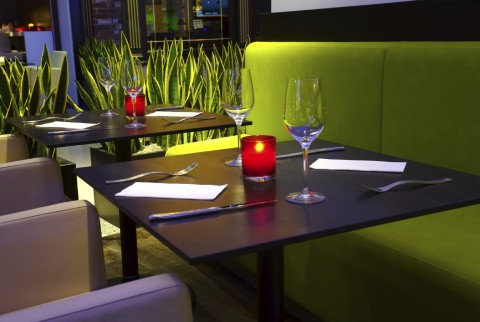
‘n Mooi omgewing maak ‘n ete meer genotlik. / “An attractive setting enhances a meal.”
Also, a restaurant can be an amazingly pleasant setting to practice your Afrikaans speaking and pronunciation skills. So, let’s get cracking with a few of the most common restaurant phrases in Afrikaans!
2. Finding a Good Restaurant in South Africa
Eating out is a favorite pastime among South Africans, so you won’t have any difficulty finding an excellent restaurant in South Africa. Doing a little research online or getting a recommendation from someone you know will point you in the right direction. Do so in Afrikaans!
Following are some Afrikaans restaurant phrases that you can use when asking someone for recommendations.
| Asking For Recommendations | |
| Afrikaans Questions | English Translations |
| Is hier ‘n goeie restaurant in die omgewing? | “Is there a good restaurant nearby?” |
| Is daar ‘n goeie vegetariese / vegan restaurant hier naby? | “Is there a good vegetarian / vegan restaurant nearby?” |
| Watter is jou gunsteling eetplek? | “Which is your favorite eatery?” |
| Kan jy ‘n luukse restaurant aanbeveel? | “Can you recommend an upmarket / luxurious restaurant?” |
| Watter eetplek sou jy voorstel vir ‘n baie spesiale afspraak? | “Which eatery would you propose for a very special date?” |
| Waarheen kan ek my gesin neem vir ‘n lekker middagete? | “Where can I take my family for a nice lunch?” |
| Watter is die beste restaurant in Suid-Afrika? | “Which is the best restaurant in South Africa?” |
| Wat dink jy van Pienkie se Plek? Kan jy dit aanbeveel? | “What do you think of Pinky’s Place? Can you recommend it?” |
| Is daardie ‘n wegneem-ete restaurant? | “Is that a fast-food restaurant?” |
| Moet ‘n mens vooraf bespreek? | “Should one book ahead of time?” |

Is daar ‘n goeie restaurant in die omgewing? / “Is there a good restaurant nearby?”
Great, so you’ve established where you’d like to go. Now let’s make sure you’ll be able to get a place in the restaurant by making a reservation!
3. Booking at a Restaurant
Typically, reservations might be necessary, but not required for popular restaurants with an excellent reputation. These accept walk-in customers too, but you might find yourself waiting exceedingly long for a table. Reservations are required, though, at exclusive fine restaurants where meal preparation takes a lot of time and is only done per booking.
If the eatery is not high-end, such as bistros, teagardens, family restaurants, or steakhouses, walk-ins are welcome and the norm. Only in the case of large groups will you still need to book a table or tables, if you want to be sure of your place.
1- Making a Booking
Below is a list of phrases you can use for different scenarios such as booking for a couple, a group, or to book out the entire restaurant. It also includes other, more general questions, such as opening and closing times, whether children are welcome, and so forth.
- ➜ To make a reservation, you can visit the restaurant yourself, but most people simply call. Therefore, consider this list of Afrikaans phone call phrases to make sure you get that booking. The article also includes helpful tips about Afrikaner phone etiquette.
| Making a Booking | |
| Afrikaans Questions and Phrases | English Translation or Approximate |
| Is julle oop vanaand / oor naweke? | “Are you open tonight / over weekends?” |
| Hoe laat sluit die kombuis? | “What time does the kitchen close?” |
| Neem die sjef / kok spesiale bestellings? | “Will the chef / cook take special orders?” |
| Mag ons ons eie wyn bring? | “Are we allowed to bring our own wine?” |
| Hoeveel is die kurkgeld per bottel wyn? | “How much is the corkage fee per bottle of wine?” |
| Bedien julle Halaal kos? | “Do you serve Halal food?” |
| Is kinders welkom? | “Are children welcome?” |
| Is daar veilige speelplek vir kinders buite? | “Is there a safe place for children to play outside?” |
| Verskaf julle volwasse toesig by die speelarea? | “Do you provide adult supervision at the play area?” |
| Ek wil graag ‘n tafel bespreek vir vanaand, asseblief. | “I’d like to book a table for this evening, please.” |
| Het julle plek vir vier mense buitekant? | “Do you have a table for four people on the patio / outside?” |
| Ons is twee volwassenes en twee kinders. | “We’re two adults and two children.” |
| Ek wil asseblief ‘n bespreking maak vir twee mense op Dinsdag om eenuur. | “I’d like to make a booking for two people on Tuesday at one o’clock.” |
| Ek wil graag ‘n bespreking maak vir ‘n groep van tien. Dis vir ‘n werksfunksie / verjaarsdagpartytjie. | “I’d like to make a reservation for a group of ten. It’s for a work-related event / birthday party.” |
| Neem julle besprekings vir troues? | “Do you take bookings for weddings?” |
| Watter datums het julle beskikbaar? | “Which are the available dates?” |
| Ek wil graag die hele restaurant bespreek vir die aand van die sewe-en-twintigste Desember. | “I’d like to book the whole restaurant for the evening of December twenty-seventh.” |
| Sal daar genoeg parkeerplek vir meer as vyftig mense wees? | “Will there be enough parking space for more than fifty people?” |
When calling the restaurant to make a reservation, you will need to give them your contact details for several possible reasons.
They might be full and would want to let you know if a place becomes available, for instance. Or perhaps you want confirmation of the booking in writing. Also, especially if your reservation is for a large group and/or a special occasion, they might want to keep you up-to-date regarding special requests, wine lists, the menu, etc.
- ➜ Also, listen to this free recorded dialogue to hear how a restaurant reservation is made in Afrikaans.
Below are a few useful phrases for this purpose.
| Giving Contact Information | |
| Afrikaans Phrase | English Translation or Approximate |
| Asseblief stuur vir my bevestiging van die bespreking. | “Please send me confirmation of the booking.” |
| My epos adres is… | “My email address is…” |
| My foonnommer is… | “My phone number is…” |
| Hier is ‘n alternatiewe foonnommer. | “Here is an alternative phone number.” |
| Ek het nie ‘n landlyn nie. | “I don’t have a landline.” |
| Jy kan my op WhatsApp of Telegram kontak by… | “You can contact me on WhatsApp or Telegram at…” |
| As jy my nie in die hande kan kry nie kan jy my eggenoot / vriend / kollega kontak by… | “If you can’t get hold of me, you can contact my partner / friend / colleague at…” |
2- Special Requests
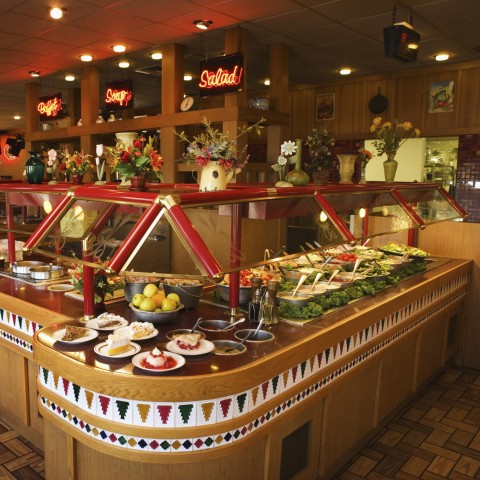
Ons hou van buffet etes. / “We like buffet meals.”
When you book at a restaurant, sometimes it’s not as simple as just reserving a table for the number of people who will be dining there and then showing up on the day. Often, there are arrangements that must be made ahead of time.
This is especially true if you are making a reservation for a large group, of course, but even if you are just booking for a couple, you might have some specific requirements.
However, eating out in Afrikaans need not be a headache at all. Here are some more excellent phrases that will help you to make your requirements known in the language of many of the natives in South Africa.
Note: Many of these phrases can be used as is when you’re already at the restaurant as a walk-in.
| Special Requests | |
| Afrikaans Sentence | English Translation |
| Waar wil jy / julle sit? | “Where would you like to sit?” |
| Watter is jou / julle gunsteling tafel? | “Which is your favorite table?” |
| Kan jy asseblief seker maak dat die tafel buite is? | “Can you make sure the table is outside, please?” |
| Ek wil daar sit. | “I want to sit there.” |
| Ons wil graag buite sit. | “We’d like to be seated outside.” |
| Ek sal ‘n tafel binne verkies. | “I’d prefer a table inside.” |
| Ons wil graag by ‘n venster met ‘n uitsig sit. | “We’d like to sit by a window with a view.” |
| Waar is julle privaatste tafel? | “Where is your most private table?” |
| Kan ons ‘n groter tafel kry, asseblief? | “Could we have a bigger table, please?” |
| Ons gaan ons huweliksherdenking vier. Het julle miskien ‘n tafel vir twee in ‘n private area? | “We’ll be celebrating our wedding anniversary. Do you have a table for two in a private space, by any chance?” |
| Verskaf julle babastoele? | “Do you provide baby chairs?” |
| My pa is allergies vir neute. Gaan dit ‘n probleem vir die kok wees? | “My father is allergic to nuts. Will that be a problem for the cook?” |
| Is julle restaurant maklik toegangbaar vir rolstoele? | “Does your restaurant have easy wheelchair access?” |
| Is die toiletgeriewe maklik toegangbaar vir rolstoele? | “Does the restroom have easy wheelchair access?” |
Whether or not you are making a booking ahead of time, there are likely going to be special menu-related requirements. Not everybody likes, or can eat, the same food! It will be wise to determine, in advance, if the restaurant caters to the various gastronomic preferences and dietary restrictions, especially those of a group.

Buitelug eetplekke is baie gewild in Suid Afrika. / “Outdoor eateries are very popular in South Africa.”
Below is a list of useful phrases that will help you make sure everyone is happy with the menu. Again, many of these can be used when making a booking, and when you’re already in the restaurant.
| Bookings and Requests for Groups | |
| Afrikaans Sentence | English Translation |
| Wats jou gunsteling dis? | “What’s your favorite dish?” |
| Sal jy asseblief julle spyskaartopsies aanstuur? | “Would you please forward your menu options?” |
| Het julle enige vasgestelde spyskaarte? | “Do you have any set menus?” |
| Die spyskaart moet a la carte wees, asseblief. | “The menu must be a la carte, please.” |
| Ons sal die buffet-opsie neem. | “We’ll take the buffet option.” |
| Ek wil graag my eie spyskaart skep, gebaseer op die disse wat julle aanbied. | “I’d like to create my own menu, based on the dishes you offer.” |
| Het julle ‘n spyskaart vir kinders? | “Do you have a menu for children?” |
| Ek wil afsonderlike spyskaarte vir vegane, vegetariërs en vleiseters hê. | “I’d like separate menus for vegans, vegetarians, and meat eaters.” |
| Ek wil spyskaarte met die maatskappy se logo spesiaal vir hierdie geleentheid gedruk hê. | “I want menus with the company logo printed specially for this occasion.” |
| Ons wil graag spesiale spyskaarte laat druk vir die troue. | “We’d like to have special menus printed for the wedding.” |
Naturally, if you are planning a wedding, a birthday party, a work function, or any other group outing, there are likely to be specific requirements when it comes to decor, seating arrangements, and the like. In the table below, you will find some useful phrases that will help you when it comes to planning these things.

Baie restaurante maak voorsiening vir musiekopvoerings. / “Many restaurants make provision for live music performances.”
| Bookings and Requests for Groups Cont. | |
| Afrikaans Sentence | English Translation |
| Ek wil graag die hele restaurant bespreek vir ‘n huweliksonthaal. | “I’d like to book the entire restaurant for a wedding reception.” |
| Sal dit moontlik wees om ‘n tafel vir twintig te bespreek? | “Would it possible to book a table for twenty?” |
| Ek wil graag twee tafels bespreek, elk vir tien mense. | “I’d like to book two tables, each for ten people.” |
| Met wie kan ek praat oor dekor en sitplekreëlings? | “Who can I speak to about decor and seating arrangements?” |
| Asseblief hou my op datum van enige vordering met die dekor en spyskaartbeplanning. | “Please keep me updated about progress with the decor and menu planning.” |
| Ek wil graag naamkaartjies op die tafels hê. | “I’d like to have name cards on the tables.” |
| Verskaf julle verjaarsdag versierings/ blomme? | “Do you provide birthday decorations / flowers?” |
| Verskaf julle versierings vir herdenkings / troues? | “Do you provide decorations for anniversaries / weddings?” |
| Kan julle ‘n verjaarsdagkoek voorsien? | “Can you provide a birthday cake?” |
| Asseblief maak seker daar is ‘n tafel vir die geskenke. | “Please, ensure there’s a table for the gifts.” |
| Ek wil graag sjampanje bestel vir die heildronk. | “I’d like to order champagne for the toast.” |
| Die wynlys sal spesiaal gedruk word. | “The wine list will be specially printed.” |
| Hierdie is my verkose wyne. | “These are my preferred wines.” |
| Ek wil vroeg begin met die voorbereidings. | “I’d like to start early with the preparations.” |
| Is daar genoeg spasie om ‘n vertoning te hou? | “Is there sufficient space to put up a show / performance?” |
| Kan jy enige musikante / bands / komediante aanbeveel? | “Can you recommend any musicians / bands / comedians?” |
| Verskaf julle die klanktoerusting vir toesprake? | “Do you provide sound equipment for speeches?” |
| Stel julle die klanktoerusting op? | “Do you set up the sound equipment?” |
| Ek wil graag die klank self toets, asseblief. | “I’d like to test the sound myself, please.” |
| Kan ons asseblief vier kelners spesifiek vir die geleentheid kry? | “May we please have four designated waiters for the event?” |
Time to eat out!
4. At the Restaurant
You’re at the restaurant and are instructed to wait for waiter to assist you, or you’re taken directly to your table. It doesn’t happen often but sometimes you’ll have to ask for assistance.
Whatever the scenario, and irrespective of who you’re with, ordering from the waiter in Afrikaans will definitely increase the regard everyone has for you!
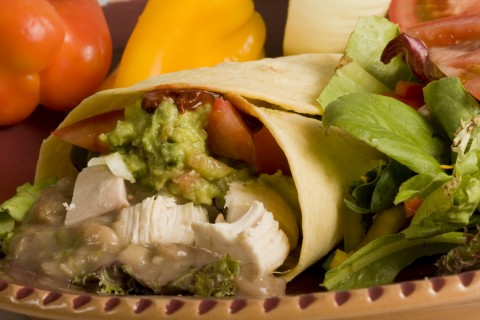
In sommige Suid Afrikaanse restaurante word ‘n wrap sandwich ‘n boerekombersie genoem. / “In some South African restaurants, a wrap sandwich is called a farmer’s blanket.
Afrikaans menus are often quite creative and amusing when it comes to naming the dishes they offer. If you are already familiar with some Afrikaans, you will no doubt have learned that some Afrikaans words can seem almost nonsensical when translated directly.
This works in reverse too. When English, or any other language, is translated into Afrikaans, the results can be, well…interesting. Have a look at these translations of some menu items that can be found when eating out in Afrikaans restaurants.
| Item in Original Language | Afrikaans Menu Version | Literal Translation in English |
| pulled pork | vlentervark | “tattered pig” |
| mixed grill | manpan | “man’s dish” |
| malvapoeding (malva “pudding”) | “mal vir haar” poeding In Afrikaans, the word “malva” sounds a bit like mal vir haar (“crazy about her”), if one says the phrase quickly. | “‘crazy about her’ pudding” |
| a wrap sandwich | boerekombersie | “farmer’s little blanket” |
| a jaffle Note: Unlike the U.S. jaffle, the South African jaffle only refers to a closed sandwich which is toasted in a round, handheld jaffle or pie iron. This delicious snack typically has a savory filling such as cooked minced meat, curry vegetables, steak-and-kidneys, etc. | boerpens-broodjie | “farmer’s-paunch sandwich” |
| a beer tower | plaasdam | “farm dam” |
| a pizza | ossewa-wiele | “ox-wagon wheels” The ossewa (“ox-wagon”) has a special place in the European Afrikaner heart because of its association with the Great Trek when the Boers trekked north from the Cape to escape British rule. |
| a cabbage roll | oumens onder die kombers | “old person under the blanket” |
You might have noticed that the word boer is used liberally in these fun names for items on the menus. This is because speakers of Standard Afrikaans associate strongly with farming life. Farming is part of their heritage, to the extent that, historically, Afrikaners of European origin were called Boers in English. The name “Boer” is based on the Afrikaans word boer which means “farmer.”
Now let’s proceed to a few good phrases for ordering from a menu.
1- How to Order in Afrikaans
In South Africa, ordering items from a menu is no different than anywhere else in the world. You’ll be met at the door by a waiter, who will seat you at your booked table or at the available table of your choice. When you’re seated, you should be handed the menu immediately.

Suid Afrikaanse wyn is wêreldwyd bekend. / “South African wines are world renowned.”
If the restaurant is licensed to serve alcohol, the wine list often forms part of the food menu. At more upmarket eateries, you can expect to be offered an extensive, separate wine menu.
1.1- Ordering Drinks
While you’re making weighty decisions about your meal, you can just as well have something to drink. Use these phrases to make sure you please your palate with the best.
| Ordering Drinks | |
| Afrikaans Phrases | English Translation or Approximate |
| Wat is jou gunsteling drankie? | “What is your favorite drink?” |
| Kan ons die wynlys sien, asseblief? | “Could we see the wine list, please?” |
| Ek wil graag drankies bestel. | I would like to order drinks. |
| Watter witwyn kan jy aanbeveel? | “Which white wine can you recommend?” |
| Het julle enige goeie wyn op special? | “Do you have any good wines on special?” |
| Bestel mens drankies by die kroeg? | “Does one order drinks at the bar?” |
| Ek wil hierdie wyn hê, asseblief. | “I’d like this wine, please.” |
| Ek bestuur vanaand, so geen alkohol vir my nie, dankie. | “I’m the (designated) driver tonight, so no alcohol for me, thanks.” |
| Ek sal ‘n glas vars lemoensap neem, dankie. | “I’ll have a glass of fresh orange juice, thank you.” |
| Kan ek ‘n glas droë, rooi huiswyn kry, asseblief. In South Africa, many licensed restaurants offer wine by the glass, but it tends to be from undisclosed, cheaper wine labels and is referred to as huiswyn or “house wine”. Label wines are offered by glass only at upmarket or luxury restaurants and these are typically more expensive. | “May I have a glass of dry, red house wine, please.” |
| Bring vir ons ‘n bottel van die De Wetshof Bateleur Chardonnay. | “Bring us a bottle of the De Wetshof Bateleur Chardonnay.” |
| Ek wil graag ‘n heildronk instel. | “I’d like to make a toast.” |
| Heildronk tyd! | “Time to make a toast!” |
| Sal jy ‘n bakkie met ys bring, asseblief? | “Would you bring us some ice, please?” |
| My seun wil ‘n Coke hê en my dogter mangosap. | “My son wants a Coke and my daughter mango juice.” |
| Sy sal ‘n filterkoffie neem. | “She’ll have a filter coffee.” |
| Ek verkies warm melk. | “I prefer warm milk.” |
| Mag ek bietjie room kry vir my koffie, asseblief? Unlike Americans, South Africans don’t, as a rule, serve cream with coffee. However, you’re welcome to ask for some; if the restaurant has in stock, they will serve it gladly and often at no extra cost. | “May I have a bit of cream for my coffee, please?” |
| Ek verkies swart koffie. | “I prefer black coffee.” |
| Kan ons nog suiker vir die tafel kry, asseblief? | “Can we have extra sugar for the table, please?” |
1.2- Ordering Food
Alcohol often serves as an appetizer, so you should be hungry by now.

Ek wil hierdie gereg hê, asseblief. / “I’d like this dish, please.”
Order your food with the following basic Afrikaans restaurant phrases.
| Ordering Food | |
| Afrikaans Phrases | English Translation or Approximate |
| Kan ons ‘n spyskaart kry, asseblief? | “Can we have a menu, please?” |
| Is ons te laat vir ontbyt? In South Africa, not all, but most eateries serve breakfast only till noon. | “Are we too late for breakfast?” |
| Watter dis kan jy aanbeveel? | “Which dish can you recommend?” |
| Watter geregte op die spyskaart is die gewildste? | “Which dishes on the menu are the most popular?” |
| Bedien julle wildsvleis? | “Do you serve venison?” |
| Bedien julle enige vegetariese of vegan geregte? | “Do you serve any vegetarian or vegan dishes?” |
| Ek wil hierdie gereg hê, asseblief. | “I’d like this dish, please.” |
| Ek eet nie rooivleis nie. | “I don’t eat red meat.” |
| Ek verkies seekos. | “I prefer seafood.” |
| Bring vir my ses oesters as voorgereg, asseblief. | “Bring me six oysters as a starter, please.” |
| Ek wil ‘n medium-rare fillet steak hê en ‘n gebakte aartappel met suurroom. | “I would like a medium-rare fillet steak and a baked potato with sour cream.” |
| Ons sal die groente deel. | “We’ll share the vegetables.” |
| Spaghetti Bolognaise vir die kinders, asseblief. | “Spaghetti Bolognaise for the children, please.” |
| Kan ek dalk die helfte van hierdie gereg bestel vir my kind? | Could I perhaps order half of this dish for my child? |
| Ek’s allergies vir XYZ. Weet jy of hierdie gereg dit bevat? | “I’m allergic to XYZ. Do you know if this dish contains it?” |
| Sy’s laktose intolerant. | “She is lactose intolerant.” |
| Ek het regtig lus vir ‘n kerriegereg. | “I really feel like having a curry dish.” |
| Geen uieringe vir my nie, dankie. Onion rings are a popular side dish at restaurants like, for instance, steakhouses. You’ll typically be asked if these should be included in your meal. | “No onion rings for me, thanks.” |
| Sal dit moontlik wees om die uieringe te ruil vir ‘n mengelslaai? | “Would it be possible to swap the onion rings for a mixed salad?” |
| Brand hierdie gereg erg? | Is this dish very spicy? |
| Het hierdie tipe vis baie grate? | Does this kind of fish have a lot of bones? |
| Sal jy vir die kok vra om nie groenpeper by die slaai te sit nie, asseblief? | Please could you ask the cook not to add green peppers to the salad, please? |
| Waar is die badkamer? | Where is the restroom? |

Wat is jou gunsteling nagereg? / “What is your favorite dessert?”
With the ordering done, you can now sit back and enjoy your drink or beverage.
2- Phrases to use During the Meal
But the chatting doesn’t stop! Comment on the food or voice your requests in Afrikaans with these phrases.
| During the Meal | |
| Afrikaans Phrases | English Translation or Approximate |
| Geniet jy jou kos? | “Are you enjoying your food?” |
| Geniet julle die ete? | “Are you enjoying your meal?” |
| Wats jou gunsteling gereg? | “What’s your favorite dish?” |
| Gee vir my die tamatiesous aan, seblief? | “Pass me the ketchup, please?” |
| Sout, asseblief? | “Salt, please?” |
| Ek wil nog chips / aartappelskyfies hê, asseblief. Here you can see that South Africans have two words for French fries. | “I’d like more French fries, please.” |
| Jy eet soos ‘n voëltjie. This Afrikaans saying comments on a person’s low appetite. | “You eat like a little bird.” |
| Ek’s nie baie honger nie. | “I’m not very hungry.” |
| Ek’s so honger soos ‘n wolf! This is a common Afrikaans saying for expressing great hunger. | “I’m as hungry as a wolf!” |
| Bring vir ons tafel sout en peper, asseblief. | Fetch salt and pepper for our table, please. |
| Kan ek ‘n servet kry, asseblief? | “May I have a serviette, please?” |
| Wow, hierdie is heerlik. | “Wow, this is delicious.” |
| Hier, vat ‘n happie. | “Here, try a (small) bite.” |
| Proe net hoe lekker. | “Have a taste, it’s very pleasant.” |
| Wil jy van my aartappelskyfies hê? Note: In most casual eateries in South Africa, it’s common for family and close friends to share or even swap their food. Romantic partners can feed each other tasty bits, it’s acceptable behavior in most restaurants. | “Would you like some of my French fries?” |
| Die vleis is so sappig en geurig. | “The meat is so juicy and flavorful.” |
| My groente is kraakvars. | “My vegetables are very fresh.” |
| Is jy nog honger? | “Are you still hungry?” |
| Is jy seker jy het genoeg gehad? Note: This is usually a courtesy question; nobody will force you to eat more food than you want or can handle, and hosts understand this. That said—your host will be pleased and flattered if you agree to an extra portion, even if it’s only the size of a teaspoon! | “Are you sure you’ve had enough?” |
| Ek is nog honger. | “I’m still hungry.” |
| Ek het genoeg gehad, dankie. | “I’ve had enough, thank you.” |
| Ek is versadig. | “I’m full.” |
| Ons is reg / gereed vir nagereg. | “We’re ready for dessert” |
| Kan ek die nageregspyskaart sien, asseblief? | “May I see the dessert menu, please?” |
| My man het ‘n baie soet tand. Note: Just like in English, when we use this saying to describe someone, it means they love eating sweet and sugary food. | “My husband has a very sweet tooth.” |
| Het julle enigiets vir diabete op die nageregspyskaart? | “Do you have anything for diabetics on the dessert menu?” |
3- Phrases to use After the Meal
The meal’s done, and it’s time to go. Do so in style with these Afrikaans restaurant phrases.
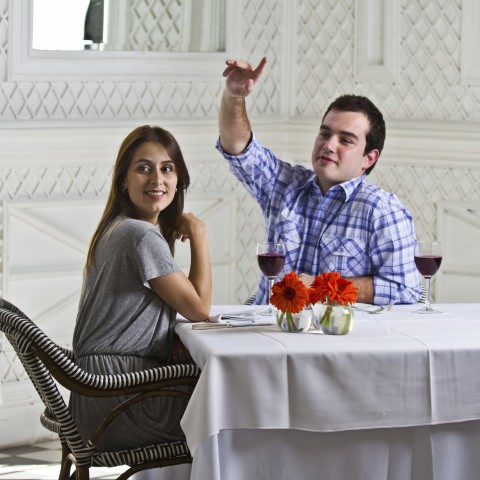
Mag ons die rekening kry, asseblief? / “May we have the bill, please?”
1.1- Asking for the Bill
An attentive waiter will notice that you’re near completion and will ask if they can bring you the bill, but it’s also customary to ask for it yourself. If the bill needs to be split, remember to alert the waiter beforehand.
| After the Meal | |
| Afrikaans Phrases | English Translation or Approximate |
| Jy kan maar die rekening bring, dankie. | “You may bring the bill, thank you.” |
| Mag ons die rekening kry, asseblief? | “May we have the bill, please?” |
| Ons gaan die rekening verdeel. | “We’re going to split the bill.” |
| Ons wag al lank vir die rekening; asseblief sal jy dit gaan haal? | “We’ve already been waiting a while for the bill; will you please fetch it?” |
| Hier is ‘n fout op die rekening. | “There’s a mistake on the bill.” |
| Sal jy dit so vinnig as moontlik regstel, asseblief? | “Will you fix this as quickly as possible, please?” |
| Dankie vir die afslag. | “Thank you for the discount.” |
| Is die fooitjie ingesluit by die rekening? | “Is the tip included in the bill?” |
| Ek los vir jou ‘n kontantfooitjie. Note: Most restaurants accept debit and credit cards, and it’s fine to include the tip in the bill. However, it’s OK to tip in cash too, if you prefer. Place it with the bill, or hand it over to the waiter personally. | “I’m leaving you a cash tip.” |
| Ek wil die oorblyfsels wegneem, asseblief. Note: Most often, patrons simply need to indicate that they want to take left-over food with. The waiter will then either remove their plate from the table and deposit the leftovers in a box in the kitchen, or they will bring a box for you to pack the food yourself. | “I want the leftover for take-away, please.” |
| Kan ek ‘n wegneem-boks kry, asseblief? | “May I have a take-away box, please?” |
Most often, our dining experiences are enjoyable and meet our expectations. What is the custom in South Africa to express your appreciation and gratitude? And what if you were not pleased with your experience?
1.2- Compliments and Complaints
A wonderful meal with loved ones in a beautiful setting is probably one of the most pleasant experiences one can wish for. Keep these tips in mind when dealing with staff:
- In South Africa, if the serving staff adds to this pleasure, it is customary to show your appreciation with a generous tip and a sincere compliment or two.
- Likewise, if the meal or your dining experience has been spoiled in any way, it’s OK, even appreciated, to immediately alert the staff of the issue. You can also wait till after the meal to express displeasure or disappointment. Negative feedback is important because it helps restaurants to maintain a high standard of service delivery.
- However, avoid diva behavior. In South Africa, temper tantrums and rudeness towards restaurant staff are socially unacceptable and will probably reduce your chances of getting a positive outcome. Also, your tantrum may just end up trending on social media for embarrassing reasons!
- What’s more, lodging a complaint in a friendly, respectful manner is more likely to result in the restaurant manager offering you drinks, beverages, or desserts on the house as added compensation. And if the mistake or problem was big and clearly on the side of the restaurant, they might even give you the meal on the house. This is solely for management discretion, though.
- Afrikaner patrons are generally not nitpickers, so they tend to overlook minor mistakes or issues. If the service was unsatisfactory but not terribly so, their dissatisfaction will probably reflect in the small size of the tip, or even lack thereof.
- Conversely, sometimes just trying extremely hard to fix a problem or delivering good service, all while maintaining a positive attitude, will earn a waiter a good tip. Afrikaners are typically generous and tolerant at heart.

Dis onnodig om ‘n vloermoer te gooi wanneer jy kla oor iets. / “It’s unnecessary to throw a tantrum when complaining about something.”
But don’t forget to thank the staff and express appreciation. Sincere compliments can make the heart glow, and sometimes hardworking restaurant staff really need this type of acknowledgment of their effort. You never know whose day you’ll be making!
And to reiterate—complaints delivered politely and without drama tend to get far better results than aggressive, entitled demands. To be shouted at in front of others is demeaning and humiliating; nobody wants to be treated like that.
Here are a few good phrases with which to compliment or complain.
| Compliments and Complaints | |
| Afrikaans Phrases | English Translation or Approximate |
| Baie dankie vir goeie diens. | “Thank you very much for the good service.” |
| Dankie, dit was ‘n heerlike aand. | “Thank you, it was a really enjoyable evening.” |
| Die kos was heerlik, baie dankie. | “The food was delicious, thank you very much.” |
| Hierdie gereg was iets besonders. | “This dish was exceptional.” |
| Ons het alles regtig geniet. Baie dankie vir jou / julle moeite. | “We really enjoyed everything. Thank you so much for your effort.” |
| Julle sal ons beslis weer sien. | “You will definitely see us again.” |
| Ek sal hierdie restaurant met graagte aanbeveel. | “I will recommend will restaurant with pleasure.” |
| Baie dankie, jou diens was uitstekend. | “Thank you very much, your service was excellent.” |
| Dankie vir ‘n heerlike aand. | “Thank you for a wonderful evening.” |
| Ek wil graag met die bestuurder / kok / sjef praat, asseblief? | “I’d like to speak to the manager / cook / sjef, please?” |
| Haar diens was werklik uitnemend. | “Her service was truly exceptional.” |
| Gee asseblief my komplimente aan die kok! | “Please give my compliments to the cook!” |
| Die maaltyd was absoluut voortreflik, die beste wat ek nog ooit geniet het. | “The meal was absolutely excellent, the best I’ve ever enjoyed.” |
| Jammer maar ek moet ongelukkig ‘n probleem aanmeld. | “Sorry, but unfortunately I must report a problem.” |
| Ek is nie gelukkig hieroor nie. | “I’m not happy about this.” |
| Hierdie is nie wat ek bestel het nie. | “This is not what I ordered.” |
| Ons tafel het twee hiervan bestel, nie net een nie. | “Our table ordered two of these, not only one.” |
| Jammer maar my vleis is nie voorberei volgens bestelling nie. | “Sorry, but my meat was not prepared to order.” |
| Hierdie steak is oordoen en gebrand. | “This steak is burnt and overdone.” |
| Hier is ‘n vreemde voorwerp in my kos. | “There’s a foreign object in my food.” |
| My bord / koppie / wynglas / eetgerei is vuil. | “My plate / cup / wine glass / cutlery is dirty.” |
| Die slaai is nie eetbaar nie. | “The salad is not edible.” |
| Dis nie vars nie. | “It’s not fresh.” |
| Sal jy vir my ‘n ander een bring, asseblief? | “Will you fetch me another one, please?” |
| Nee dankie, jy hoef dit nie te vervang nie. | “No thanks, you don’t need to replace it.” |
| Verwyder dit net van die rekening. | “Just remove it from the bill.” |
| Kan jy die fout regstel, asseblief? | “Could you fix the mistake, please?” |
| Ons wag nog steeds vir die sous, en dis al ‘n ruk sedert ons dit bestel het. | “We’re still waiting for the gravy, and it’s been a while since we ordered it.” |
| Dankie vir jou begrip. | “Thanks for understanding.” |
| Moenie worry nie, enigiemand kan ‘n fout maak. | “Don’t worry, anybody can make a mistake.” |
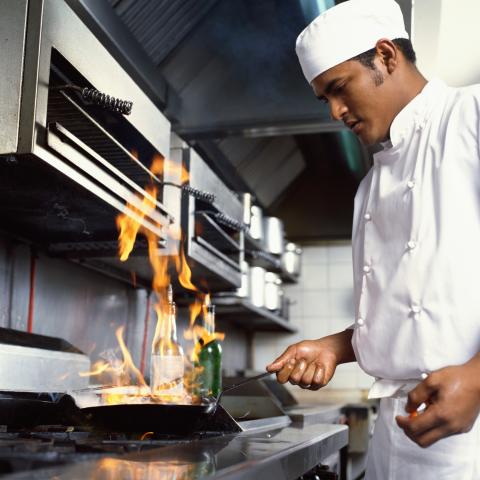
Onthou om die sjef ook te komplimenteer. / “Remember to also compliment the chef.”
- ➜ Also consider this helpful article to best compliment the staff. Or, if you quickly want to learn a few Afrikaans compliment phrases, take a look at this free lesson with recordings.
5. Recommending the Restaurant
Has your dining experience been so fantastic, that you want to recommend the restaurant? Or perhaps an Afrikaans friend is asking you for recommendations? Recommendations are probably even better than the biggest tip or the highest praise because it could mean extra business for the restaurant.
Below are some handy Afrikaans restaurant phrases you could use.
| Recommending the Restaurant | |
| Afrikaans Phrases | English Translation or Approximate |
| Daardie is ‘n uitstekende restaurant. | “That’s an excellent restaurant.” |
| Ek kan La Colombe sterk aanbeveel. | “I can strongly recommend La Colombe.” |
| Ons het nog net goeie ervaringe daar gehad. | “We’ve had only good experiences there.” |
| Julle móét daardie restaurant probeer. | “You must try that restaurant.” |
| Die uitsig is asemrowend. | “The view is breathtaking.” |
| Die plek is wonderlik atmosferies. | “The place is wonderfully atmospheric.” |
| Jy sal nie spyt wees jy’t TK’s probeer nie. | “You won’t regret trying TK’s.” |
| Hulle kos is uit die boonste rakke. | “Their food is superb.” |
| Die diens is uiters professioneel en vriendelik. | “The service is exceptionally professional and friendly.” |
| Hulle het ons baie welkom laat voel. | “They made us feel very welcome.” |
6. Bonus: Food and Restaurant Vocabulary
Note that any of the above Afrikaans restaurant phrases can be adapted by using different nouns or pronouns.
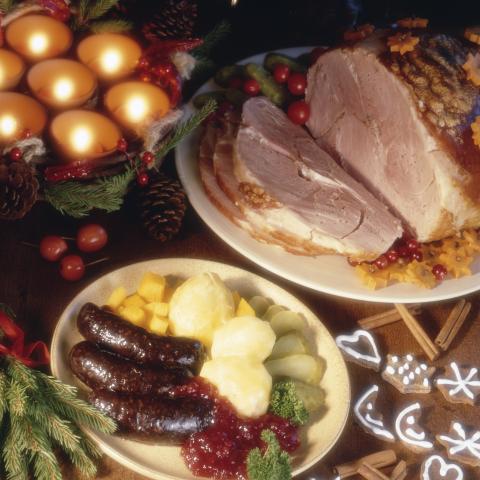
Geniet die ete! / “Enjoy the meal!”
- ➜ For a list of Afrikaans pronouns, plus how to use them in sentences, take a look at this informative article.
| Bonus Food and Restaurant Vocab | |
| Afrikaans | English Translation or Approximate |
| spek en eiers | “bacon and eggs” |
| tamatie | “tomato” |
| groente | “vegetables” |
| melkskommel | “milkshake” |
| kondimente | “condiments” |
| geurmiddels | “seasoning” |
| tamatiesous | “tomato ketchup” |
| chutney | “chutney” |
| Balsamiese asyn | “Balsamic vinegar” |
| olyfolie | “olive oil” |
| brandsous | “hot sauce” |
| gerookte vis | “smoked fish” |
| mes en vurk | “knife and fork” |
| steak-mes | “steak knife” |
| vismes | “fish knife” |
| teelepel | “teaspoon” |
| eetlepel | “tablespoon” |
| voorgereg | “appetizer” / hors d’oeuvre |
| hoofgereg | “main course” / entrée |
| nagereg | “dessert” |
| bygereg | “side dish” |
| verjaarsdagpartytjie | “birthday party” |
| werksfunksie | “formal work event” |
| werkspartytjie | “work party” |
| spesiale geleentheid | “special occasion” |
| diens | “service” |
7. Eating out in Afrikaans with AfrikaansPod101!
Are you more prepared for a uniquely South African restaurant experience, now that you’ve read this blog? Do you feel that you know how to order in Afrikaans?
If you enjoyed this article, consider signing up immediately to learn about much more than only restaurant vocabulary and Afrikaans restaurant phrases.
With over a decade of experience, AfrikaansPod101.com draws on expert knowledge of online language learning techniques to offer you a unique learning space. Thousands of Afrikaans lessons are available at your fingertips, with free resources such as apps for Android, iPhone, iPad, and Kindle Fire.
With AfrikaansPod101, you can also create your own collection of vocab lists, learn the Afrikaans alphabet, and so much more!
We offer many enrollment options to suit your personal needs. Members can also enjoy features such as:
- Culturally relevant lessons
- A free online Afrikaans dictionary
- Access to Afrikaans Key Phrases
- Hundreds of lessons in different formats.
Enroll straight away!!
About the author: Christa Davel is a bilingual (Afrikaans and English) freelance writer and journalist, and is based in Cape Town, South Africa.









